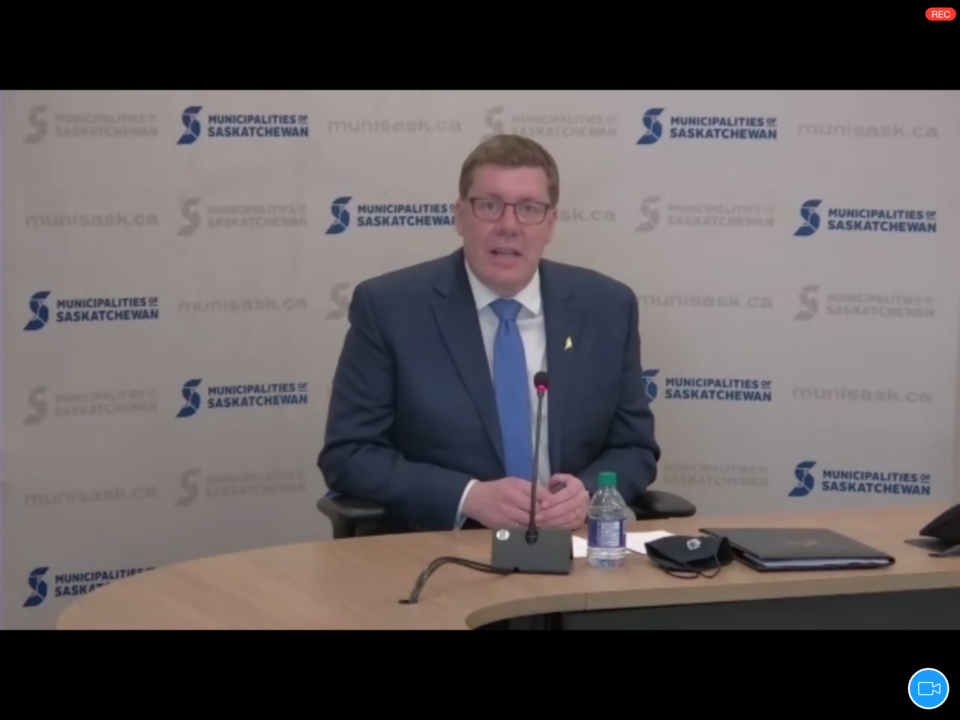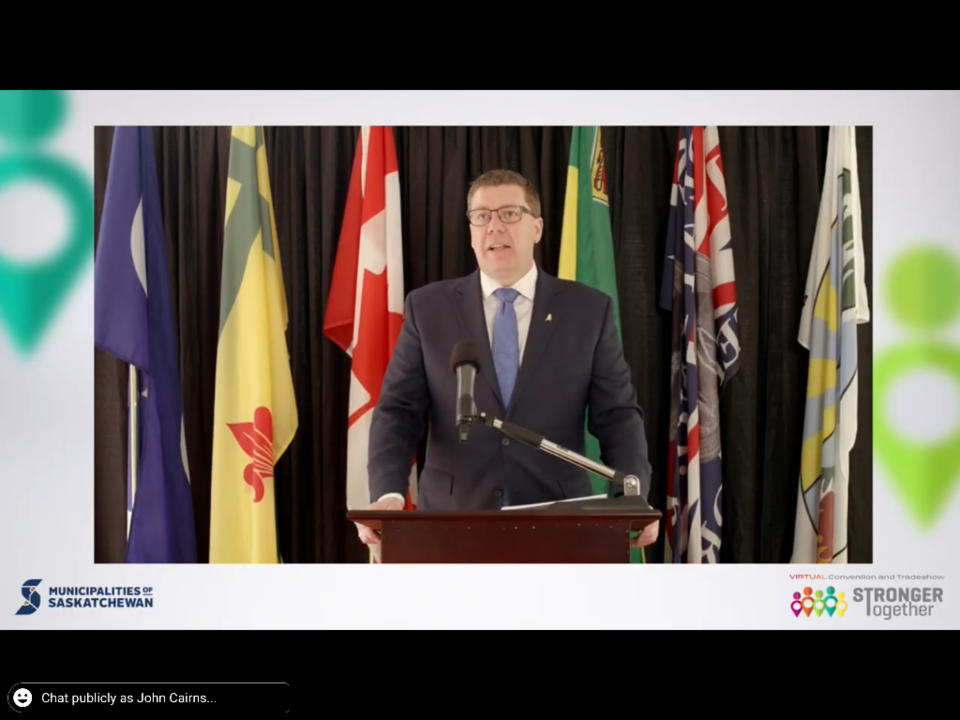The Premier’s Address at the annual Municipalities of Saskatchewan convention was very different this year.
Instead of a live address in a convention hall, Premier Scott Moe addressed delegates virtually in a live-streamed address due to pandemic restrictions.
Not surprisingly, the impact of COVID-19 was a major focus of Moe’s remarks. Much of Moe’s remarks focused on the measures the province has taken and the help municipalities were able to obtain through provincial initiatives such as the Municipal Economic Enhancement Program (MEEP).
On the pandemic and when it might end, Moe said there was reason for optimism, and that COVID-19 numbers were “moving in the right direction.”
But the premier emphasized the need for vaccines for the province to emerge from the pandemic restrictions.
“No matter how severe lockdowns and public health measures are, they will not end this pandemic,” Moe said.
“They are simply a stopgap measure to help us get to the finish line. Life will get back to normal when we achieve that finish line which is widescale vaccination, when we get enough people vaccinated.”
Moe said it was “clear the federal government has over promised and under delivered when it comes to supplying the vaccine in a timely fashion.”
He did expect shipments to pick up in the near future, and “when they do, Saskatchewan is ready to ramp up very quickly.”
He pledged more details on their mass vaccination program at a news conference Tuesday.
Moe told reporters following his address that people could expect a plan that was age-based, but have small allowances for other groups to be prioritized. At the news conference Tuesday, details are likely to be shared on the rollout of Phase Two and mass-vaccine availability.
Announcements on urban highways, revenue sharing
In his address, Moe also acknowledged the loss of jobs over the past year and cited the need for the government to support a strong economic recovery.
“We want those jobs back. We are going to move heaven and earth to get those jobs back.”
Among his announcements was the doubling of the Urban Highway Connector Program from $3 million up to $6 million in capital funding, which would be available to improve highways in the province’s smaller centres.
This was being done to “advance projects that are crucial for our economy, for our economic recovery, and for the quality of safety and life in our communities.”
North Battleford is among a number of cities mentioned in the province’s media release as having rehabilitation projects that are identified as “priorities” in the Urban Highway Connector Program’s multi-year plan.
There are also significant changes coming with the Ministry of Highways assuming 100 per cent of the maintenance and rehabilitation costs for urban connectors in Saskatchewan communities as of April 1.
Moe also confirmed $7 million is being invested by the province in 30 projects as part of the Investing in Canada Infrastructure Program.
Premier Moe also confirmed there would be no changes to the revenue sharing formula under the Municipal Revenue Sharing Program. More than $275 million would be provided to Saskatchewan municipalities this coming year, but Moe acknowledged revenue sharing would be down slightly in the coming year due to a slightly weaker PST. There may be another drop due to the impact of COVID-19, he said.
But the decrease would be “far more than offset,” he said, by $150 million in the Municipal Economic Enhancement Program and $70 million in Safe Restart funding,
“Our revenue sharing remains... one of the most generous, one of the most predictable and transparent programs of its kind in Canada, and continues to be the envy of the nation,” said Moe.

No change coming to construction PST
In a virtual media scrum with reporters following his address, the News-Optimist asked the premier if there could be any change coming to the imposition of provincial sales tax on construction for municipal projects — a hot issue at North Battleford city hall in the wake of news of a $1.5 million overage on their sanitary sewer trunk main project. About half of that amount was attributed to construction PST, pushing the cost of the project above $15 million.
On whether his government would make changes to construction PST, Moe responded “no, not at this time.”
He added the PST “would have been part of the planning and construction process of that particular project and others across the province.”
However, Moe did point to the funding flowing to municipalities under revenue sharing, as well as the “unprecedented investment” under the MEEP program “so that municipalities such as North Battleford and Battleford can be able to invest in projects just like this with these additional funds.” He also pointed to the Safe Restart funding available as well.
Moe added that ultimately an increase in PST revenue in coming years “will mean a larger portion of that PST amount and ultimately a larger portion of the municipal revenue sharing portion in the years ahead.”
Regarding UHCP funding, Moe indicated dispersement of funds would be done on an application and approval-based basis according to an existing formula in place.

.png;w=120;h=80;mode=crop)


